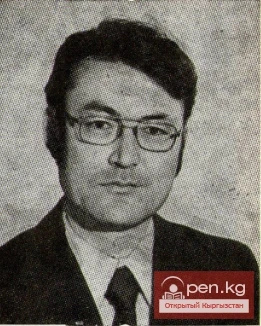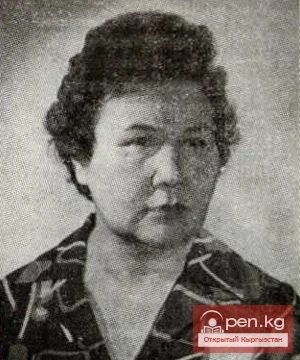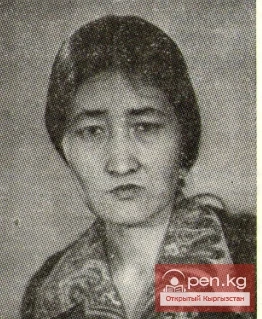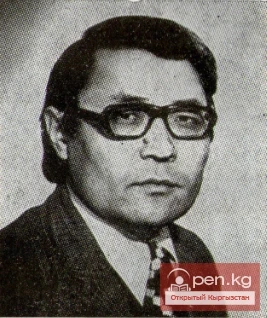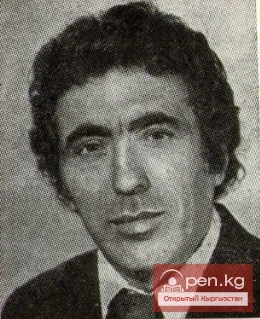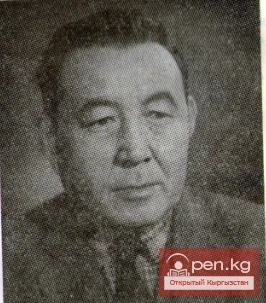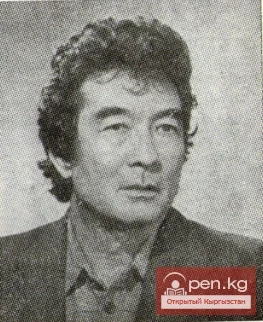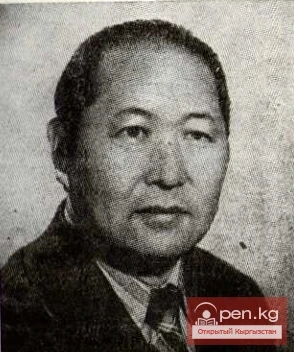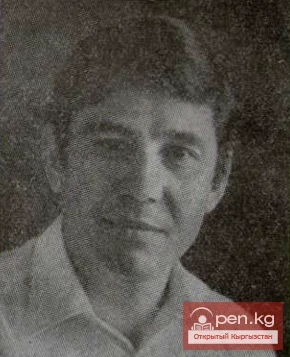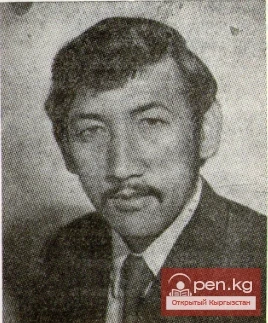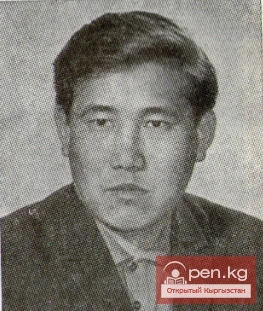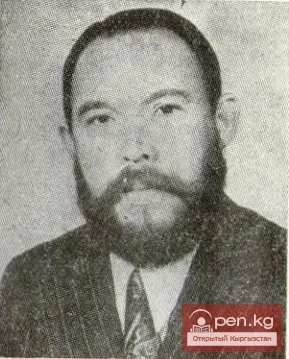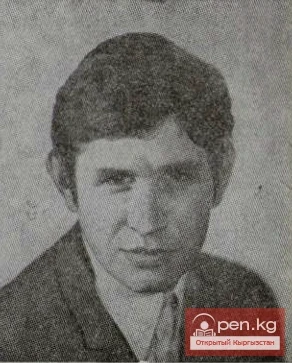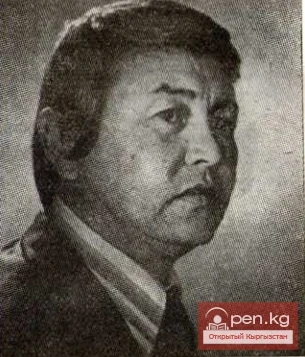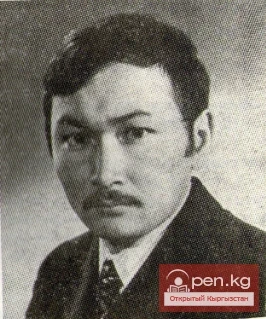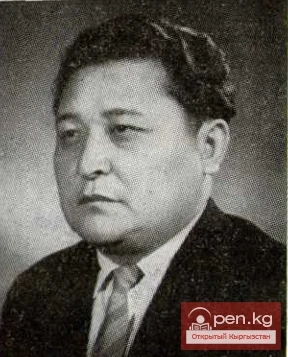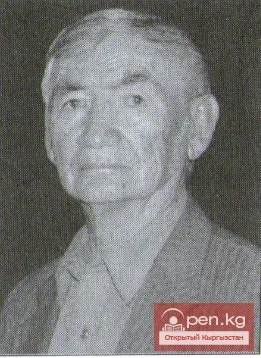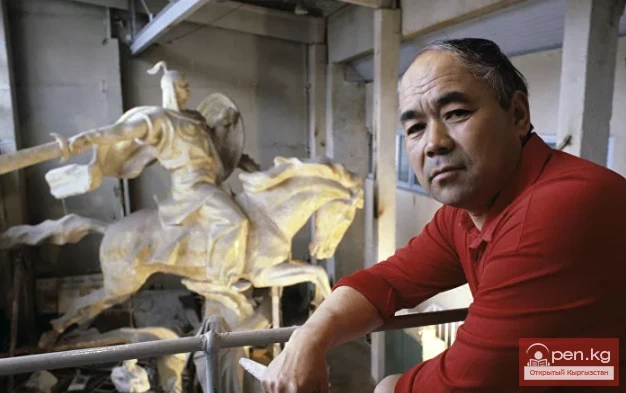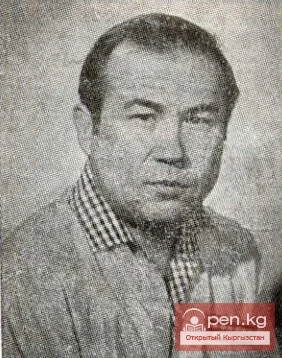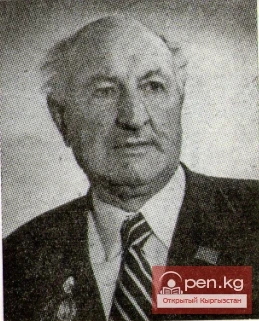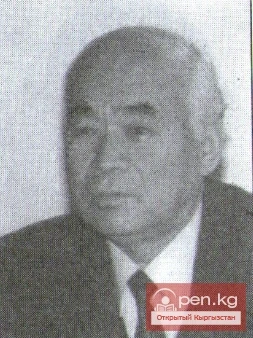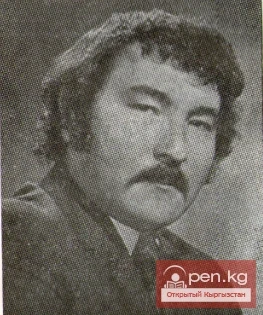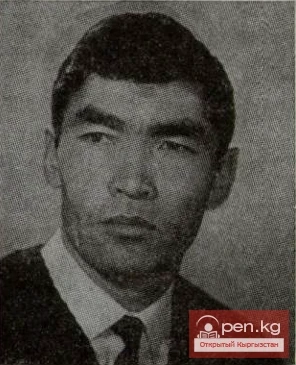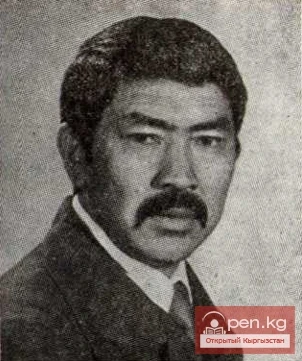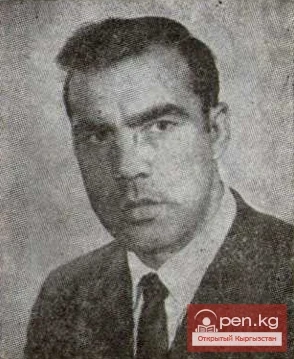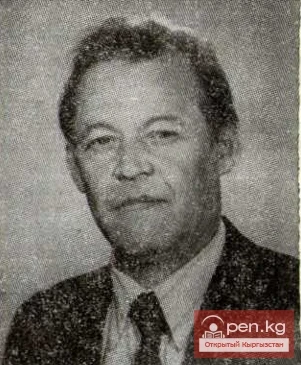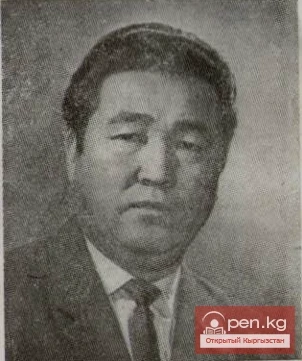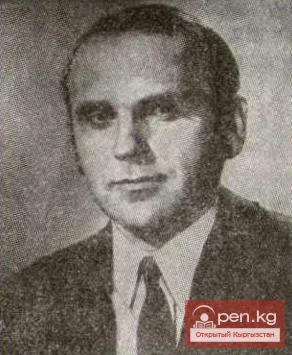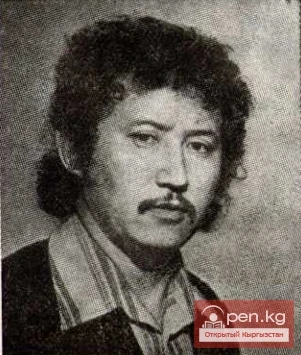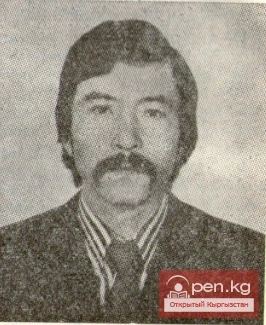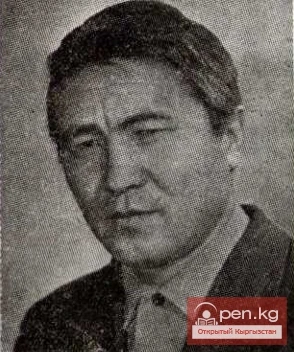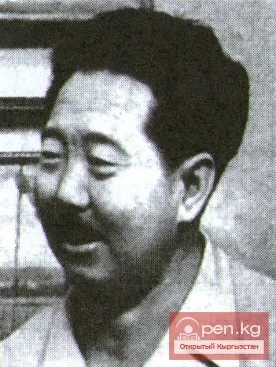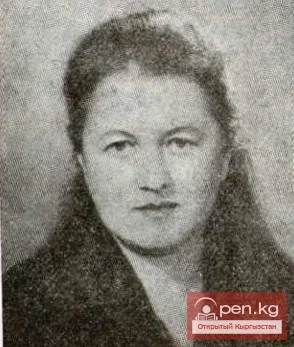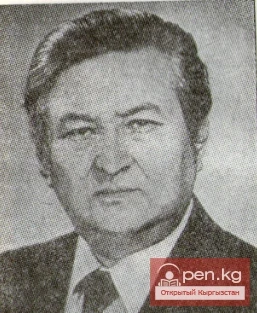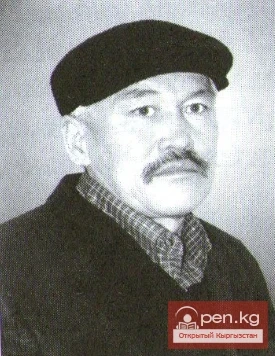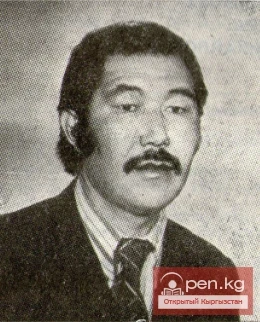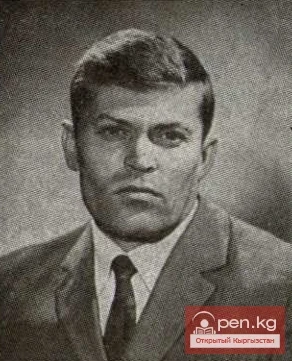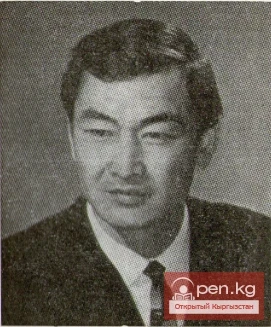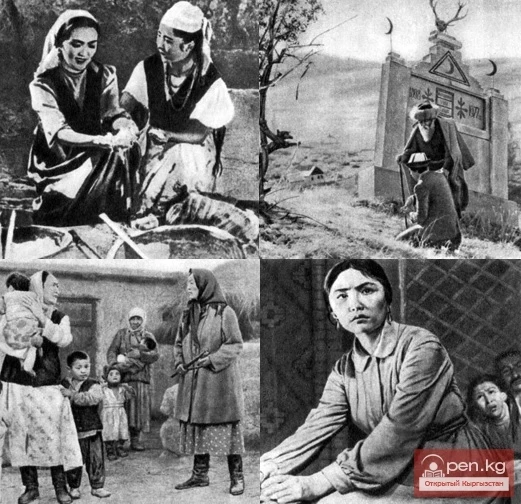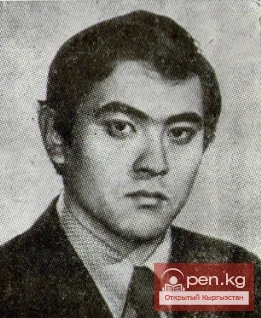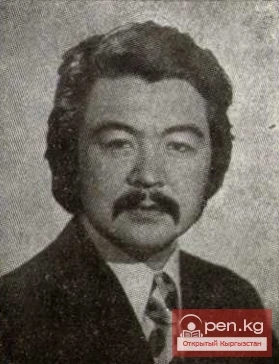
Shamsiyev Bolotbek Tolenovich
Film director. Honored Artist of the Kyrgyz SSR (1973). People's Artist of the Kyrgyz SSR (1975). Laureate of the Lenin Komsomol Prize of Kyrgyzstan (1969) and the State Prize of the USSR (1977). Member of the Communist Party of the Soviet Union since 1972. Born on January 12, 1941, in the city of Frunze in a poet's family. After graduating from high school in 1958, he worked as an apprentice auto mechanic at the "Selkhoztrans" bus depot. From March to July 1959, he was a sound operator's assistant at the Frunze Film Studio. From September 1959 to June 1964, he studied at VGIK, in the workshop of Professor Alexander Mikhailovich Zguriidi.
B. Shamsiyev began his independent creative activity in 1961, successfully playing the role of Kemel in the film "Heat" (1963) by L. Shepitko.
In his diploma film "Manaschi" (1965), the budding director turned to an extraordinary person. Its hero became the Kyrgyz rhapsodist of the 20th century — Sayakbay Karalaev, whose personal fate is inseparably linked to the fate of the Kyrgyz people during the Great October Revolution and the construction of a socialist society.
In the documentary film "Chaban" (1966), exploring the life of the most ordinary profession in Kyrgyzstan and the country, the director saw in his difficult, complex struggle with nature a manifestation of the heroic character of the modern worker. The courage, honesty, and modesty of shepherd Rakhmatala Sartbaev, Hero of Socialist Labor, deputy of the Supreme Soviet of the USSR, member of the Central Committee of the Komsomol, serve as a high example to follow. The film became one of the major successes of Kyrgyz documentary cinema.
The experience of "Manaschi" and "Chaban" confirmed Shamsiyev's belief that the starting condition of the plot of a film of any genre should be the extraordinary nature of its central hero. This later led to the creation of the images of Bakhtygul in "The Shot at the Karash Pass" (1969) and Karabalta in "The Scarlet Poppies of Issyk-Kul" (1971).
At the center of the story chosen by the director for the adaptation of M. Auezov's novella "The Event at Karash-Karash" is the fate of the poor hero Bakhtygul — a man of great courage, crystal honesty, and amazing kindness. The entire plot of the film is built on the story of the relationship between the mirza Zharasbay and the poor man Bakhtygul. The deep social and class reasons underlie their conflict. Bakhtygul's transition from blind devotion to Zharasbay to fighting against him reflects the socio-historical path of the peoples of Kazakhstan and Kyrgyzstan at the end of the 19th and beginning of the 20th centuries.
The next film by B. Shamsiyev, "The Scarlet Poppies of Issyk-Kul," became a monodrama, where the main weight of the director's idea lay on the image of Karabalta, who, through his biography, seemed to continue the fate of Bakhtygul.
After "The Scarlet Poppies," B. Shamsiyev made the film "Echo of Love" (1974) by order of the Central Television based on the story by Ch. Aitmatov "On the Baydamtal River." The intimate story of the unfulfilled happiness of Nurbek and Asiya is told poetically and without melodramatic overtones. It contains a condemnation of cowardice, insincerity in love, and affirms the necessity of trust in relationships between people connected by a great and deep feeling.
The director's further appeal to the works of the great writer — the adaptation of the novella "The White Steamboat" (1975) led to great success. Immediately after its release, B. Shamsiyev's new work received wide public recognition and unanimous approval from viewers and critics. At the IX All-Union Film Festival in Frunze in 1976, it was awarded the Volyn Prize.
As a serious artist, carefully exploring the moral problems in the life of the village, the thoughts and feelings of the youth of the 70s, B. Shamsiyev manifested himself in the film "Among People" (1978, prize for vivid depiction of the problems of modern village life at the XII All-Union Film Festival in Ashgabat in 1979), created in collaboration with VGIK graduate A. Suyundukov. The film advocates for the principles of high humanism in the everyday life of people, for true decency in their relationships.
In the next film — the adaptation of Ch. Aitmatov's novella "Early Cranes" (1979, Grand Prize at the XIII All-Union Film Festival in Dushanbe in 1980) - B. Shamsiyev revealed the process of early maturity, civil maturation of a generation whose childhood and adolescence fell during the difficult years of war.
Awards: Honorary Certificate of the Supreme Soviet of the Kyrgyz SSR (1969). Jubilee medal "For Valorous Labor. In Commemoration of the 100th Anniversary of the Birth of V. I. Lenin." Order of the "Badge of Honor" (1970).
FILMS AWARDED AT ALL-UNION AND INTERNATIONAL FILM FESTIVALS
"Manaschi" — diploma of the I degree at the competition of cinematographers of Central Asia and Kazakhstan in Almaty (1965); second prize at the All-Union Film Festival in Kyiv (1966); Grand Prize at the International Short Film Festival in Oberhausen (FRG, 1966).
"Chaban" — diploma of the I degree, "Mountain Crystal" prize at the competition of cinematographers of Central Asia and Kazakhstan in Ashgabat (1966); diploma for the best chronicle-documentary film at the All-Union Film Festival in Leningrad (1968); second prize at the International Film Festival in Mangheim (1968).
"The Shot at the Karash Pass" — first prize at the competition of cinematographers in Almaty (1969); second prize at the All-Union Film Festival in Minsk (1970).
"The Scarlet Poppies of Issyk-Kul" — special prize at the International Film Festival in Strasbourg (1973).
"The White Steamboat" — Grand Prize at the All-Union Film Festival in Frunze (1976); State Prize of the USSR (1977); Grand Prix (Golden Alpine Rhododendron) at the "Man and Mountains" festival in Trento (1977, Italy).
"Early Cranes" — Grand Prize at the XIII All-Union Film Festival in Dushanbe (1980).
Member of the Union of Cinematographers of the USSR since 1967.
BOOKS, ARTICLES, REVIEWS
Main Stream. — "Pravda," 1969, February 21.
We Are Lucky. — "Soviet Cinema," 1969, March 1.
Our Film About Youth and For Youth. — "Komsomolets of Kyrgyzstan," 1970, February 10.
People of Thought and Action. — "Soviet Screen," 1971, No. 23, p. 1.
Source of Inspiration — the Labor of the People. — "Soviet Culture," 1972, May 1.
The Youngest Brother. — "Art of Cinema," 1972, No. 12, pp. 76-80.
Meet "The White Steamboat." — "Komsomolskaya Pravda," 1975, March 30.
The Feeling of a United Family. — "Art of Cinema," 1976, No. 2, pp. 21-24.
"The White Steamboat." — "Soviet Screen," 1976, No. 16, pp. 7-8.
Heroes of Ch. Aitmatov on the Screen. — "Soviet Kyrgyzstan," 1976, December 15.
"Early Cranes." — "Literary Gazette," 1976, December 15.
The Language of Cinema is Understood by All. — "Evening Frunze," 1976, December 18.
"Early Cranes." — "Literary Gazette," 1977, February 2.
"Early Cranes." — "Soviet Culture," 1977, November 8.
"I Realized That I Would Definitely Make a Film." — "Evening Frunze," 1977, November 26.
The Heart of Jamili. — "Art of Cinema," 1979, No. 4, pp. 115-116.
WORKS ON THE DIRECTOR'S CREATIVITY
Artyukhov O. Problems of Kyrgyz Cinema (in Kyrgyz). — "Ala-Too," 1969, No. 8, p. 145.
Artyukhov O. The Mystery of "Manaschi" (in Kyrgyz). — "Ala-Too," 1973, No. 9, pp. 143-150.
Karymshakov S. The Responsibility of the Artist (in Kyrgyz). — "Kyrgyzstan Culture," 1976, March 14.
Aitmatov Ch. To Be on the Front Line. — "Komsomolets of Kyrgyzstan," 1965, September 19.
Aitmatov Ch. The Cinematography of Kyrgyzstan: Great Expectations. — "Art of Cinema," 1970, No. 11, pp. 59-63.
Aitmatov Ch. For the Sake of Our Future. — "Art of Cinema," 1973, No. 0, pp. 1-3.
Aitmatov Ch. Understanding the National Character. — "Soviet Screen," 1978, No. 22, p. 3.
Alexin A. Such Different Films. — "Pravda," 1980, April 16.
Alimova G. Fidelity to the Theme. — "Soviet Kyrgyzstan," 1970, September 13.
Artyukhov O. "Manaschi." — "Komsomolets of Kyrgyzstan," 1965, August 27.
Artyukhov O. The Artist's Watch. — "Komsomolets of Kyrgyzstan," 1971, March 30.
Artyukhov O. The Mystery of "Manaschi." — Collection "On the Wings of Cinema," F., "Kyrgyzstan," 1974.
Artyukhov O. A Picture of a Great Fate (interview with S. Yutkevich, E. Gabrilovich, Yu. Raizman about the film "The White Steamboat"), — "Evening Frunze," 1975, December 23.
Afidjanova G. "The Scarlet Poppies of Issyk-Kul." — "Soviet Kyrgyzstan," 1972, February 27.
Ashimov K. The Birth of Kyrgyz Cinema. F., "Ilim," 1969, p. 102.
Ashimov K. The Screen of Kyrgyzstan Tells. M., Bureau of Propaganda of Soviet Cinematic Art, 1974, pp. 53-54, 58-59.
Ashimov K. Facing Modernity. — "Literary Kyrgyzstan," 1975, No. 6, p. 98.
Ashimov K. "The White Steamboat" on a Great Voyage. — "Soviet Kyrgyzstan," 1977, November 20.
Chaplinov M. The Roots of Unity. — "Soviet Screen," 1975, No. 20, p. 1.
Belokon G. Among People. — "Komsomolets of Kyrgyzstan," 1977, September 1.
Bokonoev S. On Such a Distant Close Border. "Soviet Kyrgyzstan," 1975, November 23.
Bokonbaev S. A Man Among People. — "Soviet Kyrgyzstan," 1979, May 20.
Boltyanskaya O. The River Baydamtal Roars. — "Soviet Culture," 1974, August 30.
Vasiliev B. The Heavy Revelation of Bakhtygul. — "Komsomolets of Uzbekistan," 1969, September 11.
Dyadyuchenko L. In the Flood. — "Literary Kyrgyzstan," 1966, No. 4, pp. 104-110.
Zhanuzakov T. The Premiere is Coming Soon. — "Pravda," 1969, June 8.
Zak M. Counter Movement. — "Soviet Culture," 1980, April 29.
Ivanov A. Jupiters in the Mountain Gorge. — "Komsomolets of Kyrgyzstan," 1970, September 26.
Ivanova T. After the Festival in Tbilisi. — "Soviet Union," 1972, No. 4, p. 14.
Ishimov V. Second Breath. — "Art of Cinema," 1972, No. 11, pp. 45-51.
Kakcheleev A. Touching the Beautiful. — "Komsomolets of Kyrgyzstan," 1974, January 24.
Karaulova G. "Early Cranes." — "Soviet Screen," 1978, No. 22, pp. 10-11.
Keshokov A. A Touch to Authenticity. — "Literary Russia," 1974, September 27.
Komarov A. "The Scarlet Poppies" in West Berlin. — "Soviet Kyrgyzstan," 1972, December 7.
Kochnev D. The Path to Maturity. — "Soviet Kyrgyzstan," 1976, April 13.
Levchenko V. The Harsh Truth of Chingiz Aitmatov. — "Evening Frunze," 1976, December 30.
Levchenko V. The Poplars that Grew Nearby. — "Soviet Culture," 1977, July 14.
Linkov A. "The Scarlet Poppies of Issyk-Kul." — "Soviet Screen," 1970, No. 20, pp. 10-11.
Lipkaya A. Formation. — Collection "Multicolored Screen TV." M., "Art," 1977, pp. 120-121.
Medvedev Yu. A Son of His Homeland. — "Evening Frunze," 1979, May 12.
Runin B. The Almaty Festival. — "Soviet Screen," 1970, No. 1, pp. 2-3.
Ryabaya I. Sky, Earth, and Mountains. — "Art of Cinema," 1979, No. 2, pp. 118-128.
Savchuk V. Chaban. — "Soviet Kyrgyzstan," 1966, October 4.
Savchuk V. The Happy Star of Bolot Shamsiyev. — "Soviet Kyrgyzstan," 1978, June 2.
Slutsky B. The Revenge of Bakhtygul. — "Soviet Screen," 1969, No. 21, p. 4.
Stishova E. Echo of Love. — "Television and Radio Broadcasting," 1975, No. 2, p. 25.
Suyundukov A. The Revelation of Bakhtygul. — "Komsomolets of Kyrgyzstan," 1969, August 26.
Tyurin Yu. "Again and Again the Plowmen Plow the Field." — "Soviet Screen," 1979, No. 23, p. 3.
Khloplyankina T. The Path to the Pass. — "Art of Cinema," 1969, No. 5, pp. 71-77.
Khloplyankina T. "I Am Not Inventing Anything New..." (Film Director Bolot Shamsiyev). — Collection "Cinema of Soviet Kyrgyzstan." M., "Art," 1979, pp. 220-232.
Cheremushkina A. Facets of Talent. — "Soviet Kyrgyzstan," 1969, December 3.
FOREIGN FILM CRITICISM
Andreev F. "The Scarlet Poppies of Issyk-Kul" (in German). — "Filmspiegel," 1972, No. 26.
"The White Steamboat" (in Czech). — Magazine "What Interests You," 1977, No. 4.
Gertcheva K. "The Scarlet Poppies of Issyk-Kul" (in Bulgarian). — "Filmovi novini," 1973, No. 3.
Gertcheva K. Bolot Shamsiyev (in Bulgarian). — "Filmovi novini," 1975, No. 12.
Hoffmann G. An Exciting Speech About Good and Beauty. "The White Steamboat" — an Epic Film Based on Ch. Aitmatov (in German) — "National Zeitung," 1977, April 15.
Dimova D. "The Shot at the Karash Pass" (in Bulgarian). — "Filmovi novini," 1970, No. 5.
Dimova D. "The White Steamboat" (in Bulgarian). — "Filmovi novini," 1976, No. 12.
Zand N. A Year of Soviet Cinema from Kyrgyzstan (in French). — "Le Monde," 1976, May 13.
Kolesnikova N. A New Address for Masters (in Polish). — "Ekran," 1967, No. 9, p. 12.
Karch D. The Sadness of the Smiling Poet (in Polish). — "Kino," 1979, No. 8.
Korton M. On the Moral Qualities of a Person. A Conversation with Director Bolot Shamsiyev (in Czech). — "Rude pravo," 1976, February 25.
Martens M. Soviet Cinema (in French). — "Ekran," 1978, No. 66, February 15.
Mikhaylovska E. IX All-Union Film Festival — Films and Trends (in Bulgarian). — "Kinoizkustvo," 1976, No. 7.
Between Dream and Reality. "The White Steamboat" — a Film Based on Aitmatov (in German). — "Neue Zeit," 1977, April 14.
Naydenova V. Unity of Theme, Unity of Style (translated from Bulgarian). — "Literary Kyrgyzstan," 1973, No. 5.
Naydenova V. Old Roots of New Cinema (in Bulgarian). — "Kinoizkustvo," 1976, No. 1.
Nishichelli S. "The Scarlet Poppies of Issyk-Kul" (in Italian). — "Avanti," 1972, September 28.
Prashek Ts. "The White Steamboat" (in Polish). — "Przyjaźń," 1977, No. 15.
Roshevskiy V. Sorcerers, Poets, and Kyrgyz. A Meeting with Bolot Shamsiyev (in Polish). — "Ekran," 1976, No. 52.
Skanyetti A. "The Scarlet Poppies of Issyk-Kul" (in Italian). — "Poesie sera," 1972, September 26.
Haedler M. A Dream of Happiness. The Film "The White Steamboat" Based on Aitmatov's Novella in Our Cinemas (in German). — "Der Morgen," 1977, April 9-10.
N. Khibbin in Moscow (in English). — "Films and Filming," 1969, No. 10.
Khitraya D. A Panorama of Modern Kyrgyz Cinema (in Bulgarian). — "Filmovi novini," 1975, No. 12.
Shenborn E. Under the Sky of Kyrgyzstan (in Polish). — "Film," 1977, No. 19.
Shenhardt G. A Dream Without End (in German). — "Für dich," 1977, No. 16.
